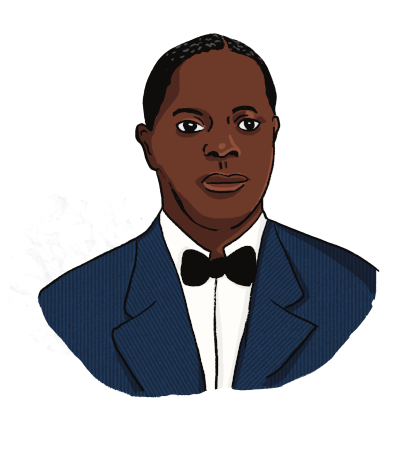
((December, 1881 – April, 1938)
King Oliver's real name was Joseph Nathan Oliver. He was a cornettist, bandleader and innovator.
He was born in Aben, Louisiana, but moved to New Orleans at a young age. From 1908 to 1917 he co-led a band with trombonist Kid Ory which was considered one of the most in demand in New Orleans in the late 1910s. One of his greatest innovations was the use of 'hot' tempos - tunes that were much faster and had greater intensity than the previous standard set in New Orleans
In the 1920s, King Oliver achieved national fame and wider recognition with his most enduring group, King Oliver and his Creole Jazz Band:
King Oliver - cornet
Louis Armstrong - cornet
Johnny Dodds - clarinet
Honoré Dutrey - trombone
Lil Hardin - piano
Bill Johnson - double bass
Baby Dodds - drums
This band made several recordings and brought King Oliver's music to a much wider audience, with the advent of recording technology and it's associated national distribution. King Oliver and his Creole Jazz Band showcased the New Orleans style he had developed, featuring its signature collective improvisation and launched the career of Louis Armstrong, who went on to become the most famous jazz musician of all time.
As a cornet player King Oliver developed his own unique voice. He was known for his use creative use of instrumental timbre and colour. He loved experimenting with the sound of his cornet, especially with mutes. He pioneered the use of mutes - bottles and cups and anything he could find, as well as using the rubber plumber's plunger as a mute; creating a distinctive sound that would later be a huge influence on the timbral writing of Duke Ellington.
King Oliver and his legacy of recordings was a huge influence on the next generations of musicians, not just in New Orleans but also nationally. Musicians would come to see his concerts to learn his style. Of all the great musicians he mentored, Louis Armstrong was his greatest protege. He called King "Papa Joe."